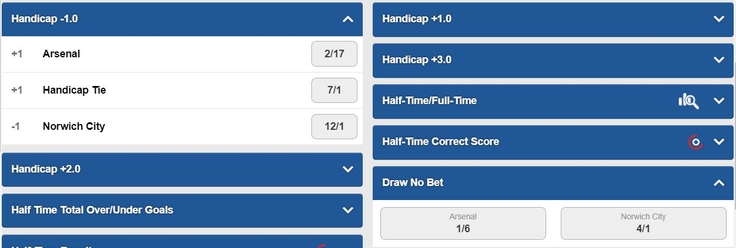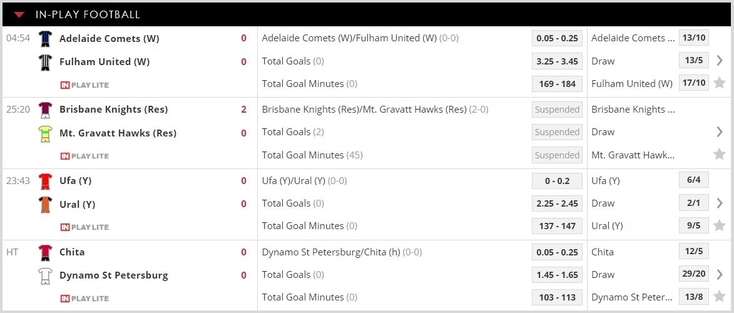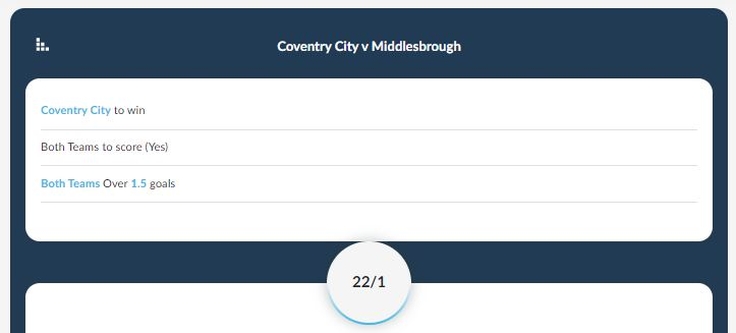On this site you’ll find free tips and predictions for popular football matches. We cover the bigger interest fixtures from English leagues alongside domestic and international cups, plus the occasional match from elsewhere.
We provide quick tips in the list below, plus specific picks for popular bet types such as Both Teams to Score, Over / Under and the ever popular Accumulator. Tips are also categorised by league and cup, and we even have a special weekend section to help you fill out your Saturday football coupon.
Today - Thursday 3rd April 2025


Tomorrow - Friday 4th April 2025


Saturday 5th April 2025








Sunday 6th April 2025








Blog Posts
Other Places to Find Free Football Tips
The web is filled to the brim with tipsters, with tips spread across websites, social media and even groups on telegram and discord. Some are good, some aren’t. And some are just a bunch of lying toe rags who fake their results to make them look better than they are.
Navigating all of these options can make it a little tricky to find someone you can trust, but thankfully there are a few resources you can turn to that make you life a little easier.
Tipster platforms are a relatively new idea that try to provide some accountability to the industry. The tipsters on these platforms have to submit their predictions before the matches, meaning that the results are independently verified – so if it says that they have a win rate of 75% and a ROI of 16% then you can trust that these figures are correct.
1. Tipstrr

One of the most popular platforms is Tipstrr. They have tipsters offering both free and paid tips on the site who collectively cover a huge range of different matches, markets and strategies. Some cover whatever they think has value, whilst other accounts like to stick to where they’re strongest – such as identifying draws or hunting for big accumulator wins.
You’ll need to sign up for an account, but then you can add as many tipsters to your feed as you want. The nice thing is that you can add and remove tipsters as you go. So if you think someone is having a bit of a bad run, just remove them from your feed. Love a tipsters free tips, then subscribe to their paid option to see more. Totally up to you.
The site shows independently verified stats for each tipster which records their win rate, ROI and average number of tips per week. The inclusion of the average odds is a nice touch as well as it quickly lets you see what kind of bets they’re placing (ie: short odds bankers or high flying accas).
Each tipster also has an individual page which shows trends over time, so you can see if the stats were from a lucky couple of weeks or if they’re a more consistent winner. You don’t have to just take their word for it either, the specific bets and recorded and available to view in full – covering every win, loss and push. That’s what makes these platforms so appealing, there’s no way for the tipsters to manipulate their results.
About The Tips
The predictions found above are a collaborative effort from a variety of different tipsters. Matches will usually be covered a couple of days before kick off and focus on a combination of value and likely outcomes. We cover a variety of different bets but they usually center around:
- Match Odds – Including variations such as half time / full time, handicap and asian handicap and win to nil.
- Both Teams to Score – A very popular bet for accumulators which we often combine with the match winner.
- Over / Under – Also increasingly popular for accas and again something we regularly combine with the match winner for increased odds.
Also included with the predictions are the trends and stats to back up the argument which may lead you to draw your own conclusions.
Are Tipsters Always Right?
 It is important to note that not all predictions will come true. This is an important fact to consider and something that many tips sites try to lead you to believe otherwise. In fact, if anyone tries to tell you they always win then they are almost certainly lying.
It is important to note that not all predictions will come true. This is an important fact to consider and something that many tips sites try to lead you to believe otherwise. In fact, if anyone tries to tell you they always win then they are almost certainly lying.
Success in betting comes from winning more than you lose, not winning every bet. To do this we need to find bets that have a good chance of winning but also where the odds are attractive enough to make the risk worthwhile.
How Does Value Betting Work?
There are many articles on the web that explain value in betting but it can be quickly illustrated through a coin toss which should have a 50-50 chance of being either heads or tails. For the purposes of this example, let’s assume that we toss the coin ten times and achieve and equal number of heads and tails (so five of each).
Scenario 1: True Odds
We bet £10 per toss on heads at the true odds of evens:
- Heads: 5 x £10 = +£50
- Tails: 5 x -£10 = -£50
- Net Result: £0
At the end of our ten tosses we’re at zero.
Scenario 2: Poor Value
For our second example let’s incorporate the bookmakers margin, meaning that we only receive odds of 4/5 on our winning bets.
- Heads: 5 x £8 = +£40
- Tails: 5 x -£10 = -£50
- Net Result: -£10
Because of the reduced odds on our winning bets we now lose £10 overall.
Scenario 3: Good Value
In our final example let’s assume that the person you’re betting against has miscalculated the chances and pay out at 6/5 for heads:
- Heads: 5 x £12 = +£60
- Tails: 5 x -£10 = -£50
- Net Result: +£10
Here we’ve made a profit of £10, purely because of the difference in the odds and these are the bets you want to try and find.
A Quick Guide to Betting on Football

For bettors, there are few sports that are better to look towards than football. Whether you’re a fan of the Premier League, La Liga or international football tournaments, there are both a wealth of competitions to bet on and a huge number of bets to choose from within those competitions. Even something like a single match can boast a huge number of markets for you to look towards.
It’s not even as if you have to stick to fixed odds sportsbooks either. The proliferation of exchange betting has meant that even the way that you place your wagers comes in different formats. People love betting on football because of the massive amount of choice in the type of bets that they can place, in addition to the fact that they’ll likely be watching a number of games over a weekend already.
How Do Betting Odds Work?
 Let’s start with the simplistic: how betting odds work. If you already know all about this then feel free to skip through to the next section. The vast majority of British bookmakers will offer you fractional odds, which will normally appear as something like ‘3/1’. The first number is the amount that you’ll be paid out and the second number is the amount that you stake. In other words, for every £1 staked you’ll get £3 back.
Let’s start with the simplistic: how betting odds work. If you already know all about this then feel free to skip through to the next section. The vast majority of British bookmakers will offer you fractional odds, which will normally appear as something like ‘3/1’. The first number is the amount that you’ll be paid out and the second number is the amount that you stake. In other words, for every £1 staked you’ll get £3 back.
Some bookmakers have started to offer their odds in decimal format, which can seem confusing if you’ve never seen them before. 3/1 odds in decimal would be 4.00, because decimal odds, sometimes called European odds, include both the stake and the return. When you place a £1 bet at odds of 3/1 your return on a winning bet would be £4 as you get your stake back. Decimal odds include this in how they’re written.
So 4.00 means that if you stake £1 then you’ll get £4 back. In order to calculate your total return you simply need to multiply your stake by the decimal odds that you’ve been offered. Let’s say that you’re looking at a Manchester United match against Liverpool, with the Red Devils given odds of 4.00 and the Merseyside club odds of 1.30. If you bet £1 on United and the bet wins, you get £4 back. A £1 winning bet on Liverpool returns £1.30.
The thing to remember with odds is that bookmakers also include a margin when they’re pricing something up, so the odds that you’ll receive are never ‘true’ odds. Liverpool might actually be more like 1.50 to win, but bookies don’t want to give you those odds because that would mean they don’t make any profit. There’s nothing that you can do about it, it’s just something that’s worth bearing in mind.
What Are The Most Popular Football Bets?
 There are countless different bets in football, but some are more popular than others. These are typically the most straightforward bets, with many people placing wagers on football not wanting to invest much time or energy into figuring out the more complex bets that we’ll come to shortly. That doesn’t make these bets any less interesting, with many of them offering decent odds depending on what you want to bet on.
There are countless different bets in football, but some are more popular than others. These are typically the most straightforward bets, with many people placing wagers on football not wanting to invest much time or energy into figuring out the more complex bets that we’ll come to shortly. That doesn’t make these bets any less interesting, with many of them offering decent odds depending on what you want to bet on.
Match Odds
This is often referred to as the 1X2 market and it’s a chance to bet on the outcome of the game. You’re choosing whether you think the home team will win (1), the away team will be victorious (2), or the match will end in a draw (X). It really is that simple, though you’ll always have to remember that figuring out what the result will be is never easy in competitive games.
In the world of Match Odds, the important thing to bear in mind is that it only counts for 90 minutes of the match. That doesn’t mean that injury time won’t count, but rather that if the game has the ability to go to extra time or penalties then your chosen result will have to be the case in 90 minutes for your wager to be a winner. You can normally bet on the ‘To Qualify’ market if you want to bet on the team that will make it through.
Both Teams To Score
This is a binary market, asking you whether or not you think both teams playing in a match will score a goal during the 90 minutes plus stoppage time that the game lasts for. You can either select Yes or No, depending on whether you think the two teams will each score a goal. It doesn’t matter who scores the goals, including own goals, nor which team wins, just whether the two teams score at least one goal or not.
Goalscorer Markets
Another simple bet you can look towards that’s always quite popular is that of the goalscorer markets. Usually these are split into three categories:
- First Goalscorer
- Last Goalscorer
- Anytime Goalscorer
These are reasonably self-explanatory, with a First Goalscorer bet meaning that you think the player will score the first goal of the game, a Last Goalscorer bet indicating that you think your chosen player will score the game’s final goal and an Anytime Goalscorer wager being a suggestion that your player will score a goal at any time during the game. Own goals don’t count, so it’s only goals scored intentionally that will be paid out on.
Correct Score
This market is a popular one because the payout on it is usually fairly big. The payout is usually fairly big because it’s really difficult to predict the Correct Score in any match, such is the number of variables that exist in a football match that can change the outcome of it. That is especially true in the age of the Video Assistant Referee, when goals can be ruled out for seemingly nothing and penalties can be given for similar reasons.
As with other markets, the Correct Score one is specifically for the 90 minutes of the match that you’re betting on. What you need to do is to correctly predict the scoreline of the match before any extra-time or penalties are taken into consideration. Again, it doesn’t matter who scores the goals, just how many there are at the full-time whistle and which team has scored them.
Advanced Football Bets
 There are some other bets on football matches that are a little more advanced. These are less popular because some people find them a little too tricky to bet on, but in reality they’re easy enough to get your head around. As always, if you’re not confident about what you’re doing then it’s probably best to steer clear of this market, such is the extent to which you want to avoid just handing a bookmaker your money.
There are some other bets on football matches that are a little more advanced. These are less popular because some people find them a little too tricky to bet on, but in reality they’re easy enough to get your head around. As always, if you’re not confident about what you’re doing then it’s probably best to steer clear of this market, such is the extent to which you want to avoid just handing a bookmaker your money.
Handicap Betting
To give you an idea of how much more complex some of these bets can be, there are actually numerous different types of handicap bets that you can place should you wish to. For the purposes of both ease and demonstration, we’re going to stick with the simplest example here. Handicap betting is, in essence, a way of using your bet to level the playing field between two unevenly matched teams.
Let’s say that you’re watching Manchester City take on Tranmere Rovers in the FA Cup. You know that the Cityzens are easily the better team, but so do the bookmakers. That means that there’s very little value in betting on Man City to win in a straight Match Betting scenario. One thing you can do is look to the handicap betting market, where you might find something like Man City -2.5.
That means that Manchester City essentially start the match down by two and a half goals. In order for your bet to be a winner, City will have to win by three clear goals in normal time. Let’s say that City win the match 3-0, that means that the ‘handicapped’ score was City 3 – Tranmere 2.5. Your bet on City is a winner. If City win 2-0 then the handicap bet would be City 2 – Tranmere 2.5 and your bet will be a loser.
That’s a simplistic example, with the actual market offering many other things besides. There are handicaps where you can bet on City with -2, for example, which would allow for a Draw market to come into play. If you bet on the draw with City at -2 then your bet would be winner if the match finished 2-0 to City, say. Think through what’s likely to actually happen, though, not just which market gives the best odds.
Draw No Bet
There are some matches in which you can feel supremely confident that one team is going to win but fear that the other side might just be able to get something out of the game with a fair wind behind them. If this is the case then one might you might want to consider is that of Draw No Bet. As the name suggests, this bet results in the wager being made void in the event of the match ending in a draw.
The advantage of this bet is that it allows you to hedge somewhat, betting on the team that you think is stronger but knowing that you might still end up getting your stake back if the match somehow ended up in a stalemate. The downside of the market is that the odds obviously won’t be as good as if you were to bet simply on your chosen team in the Match Betting market, but that’s what you get for hedging your bets.
Exchange Betting
 Those of you that feel confident in your betting knowledge might want to check out the exchanges. This is where people bet in a peer-to-peer scenario, so you’re not asking a bookmaker for odds but rather either taking odds offered by another person or else setting your own odds. It’s a complex world when you’re looking at it from the outside in, with even the language being different to fixed odds markets.
Those of you that feel confident in your betting knowledge might want to check out the exchanges. This is where people bet in a peer-to-peer scenario, so you’re not asking a bookmaker for odds but rather either taking odds offered by another person or else setting your own odds. It’s a complex world when you’re looking at it from the outside in, with even the language being different to fixed odds markets.
You can choose to either Lay or Back something happening. Let’s say, for example, that you’re placing a bet on the winner of the Premier League. You might be convinced that Liverpool are going to win the title, so you would Back them to do just that. If they do indeed win the title then your bet is a winner and if they don’t then it isn’t. Alternatively, you might think they’re not going to win it but don’t know who will, so you can Lay them.
Laying is the equivalent of saying that something is definitely not going to happen. In the instance of Laying Liverpool on the title, you’re saying that you think that any team other than the Merseyside club will win the Premier League and your bet will be a winner if that’s the outcome. It doesn’t matter which team ends up winning the title, as long as it’s not Liverpool and your bet will then be a winner.
That’s a really simplistic example of how exchange betting works, but it gives you a sense of what to expect when you check out the markets. You can bet on a whole wealth of things on the exchange, but it really is recommended that you don’t do so until you’re absolutely sure that you understand how it works and are confident in what you’re doing. Once you’ve got the hang of it, though, it will open a world of options to you.
Spread Betting

Another slightly complex way of betting is by looking at the spread. You’re essentially betting on the number of a specific thing that you think will happen in a football match, such as throw-ins. The spread on throw-ins in the game that you’re betting on might be 12.8-13. You then need to decide if you think the final outcome will be higher or lower than the amount that’s been offered on the spread.
If you think there’ll be more than 13 throw-ins then you would ‘buy’, whilst if you think it’s going to be lower than 13 throw-ins then you would ‘sell’. The amount of money that you win or lose will depend entirely on the final outcome of the match and the difference between your buy and sell level, multiplied by your stake amount. The more ‘right’ that you are, the more money you’ll end up winning.
As with betting on the exchange, this is something that you should do some research about and try to ensure that you properly understand before you get too dragged down into the market. Although you can win a lot of money if you get it right, you can also lose a lot of money if you get it wrong and you’ll want to make sure that you understand what you’re letting yourself in for.
Bet Builders & Bet Requests
In football betting markets, there are two specialised markets that you can look to if you want to place an accumulator bet on what would otherwise be related contingencies. Related contingencies are two makers that are linked to each other, such as a team winning the FA Cup semi-final and winning the final, given that the two bets are linked. Bookmakers don’t like you betting on such things, so they won’t allow it.
One way around the world of related contingencies is by using a service offered by the bookie in question that already contains the related contingencies that you’re looking toward. There are two main examples of these on offer, with one of them being the world of Bet Builders and the other being the ability to Request A Bet. Here’s a quick look at each of them and an explanation of how they work:
Bet Builders
 Bookmakers have started offering a Bet Builder service, which involves them picking a number of markets that they’ll offer together in an accumulator style. You might be able to select from the following, for example:
Bookmakers have started offering a Bet Builder service, which involves them picking a number of markets that they’ll offer together in an accumulator style. You might be able to select from the following, for example:
- Both Teams To Score
- Full-Time Result
- Number Of Corners
- Anytime Goalscorer
- Total Number Of Cards
That list is far from exhaustive, but it gives you an indication of the sort of things that you can bet on when you’re looking at a Bet Builder as an option. Remember that offers often won’t be included when you take out a Bet Builder, so if you want to bet with a certain bookmaker because they’re promised to pay out early on Match Betting if a team goes 2-0 up then you’ll need to place a straight bet.
Request A Bet
 Another system that it has become common for bookies to offer is that of the Request A Bet service. This is exactly as it sounds, with customers simply getting in touch with a bookmaker via social media or email or similar and asking them to give odds on a market that the customers has created themselves. You could get in touch with your favourite bookie and ask for odds on three goals, 12 corners, five yellow cards and a penalty, say.
Another system that it has become common for bookies to offer is that of the Request A Bet service. This is exactly as it sounds, with customers simply getting in touch with a bookmaker via social media or email or similar and asking them to give odds on a market that the customers has created themselves. You could get in touch with your favourite bookie and ask for odds on three goals, 12 corners, five yellow cards and a penalty, say.
The bookmaker doesn’t have to give you odds, of course, but you can ask for literally any market you want and see if they’ll give them to you. It is the most common way for punters to chuck a load of related contingencies together and still be offered odds by a bookie, which is why it is a market that has grown in popularity in recent years and is offered by most companies.
What To Think About
Regardless of whether you’re looking at the Bet Builder or the Request A Bet market, the thing you need to bear in mind is that the odds aren’t going to be great. Because the market has been created especially by you, bookmakers don’t need to worry about competing with other companies over prices. There’s no reason for them to give you good odds, so they very rarely will.
The odds might seem good, of course, because they’ll be long, but really they’re just ‘fine’ and you have to take it on the chin that you’re not being offered anything like true odds. That being said, normally the outcome of the various markets bettors chuck together is so unlikely that they end up loving the big payout they receive, even if they know that it really should have been much larger.
Accumulators
 Whilst we’re in the realms of talking about things that are unlikely to happen but that offer long odds, let’s have a quick discussion about accumulators. This is a market where you add together a series of things that you think will happen, winning the bet if all of your predictions come true. The standard acca that most people place is over the Match Betting market for all of the games in one weekend of action.
Whilst we’re in the realms of talking about things that are unlikely to happen but that offer long odds, let’s have a quick discussion about accumulators. This is a market where you add together a series of things that you think will happen, winning the bet if all of your predictions come true. The standard acca that most people place is over the Match Betting market for all of the games in one weekend of action.
Let’s say that you’re betting on the Premier League and all clubs are playing on a weekend. That means that there are ten games for you to bet on, with you placing a ten-leg accumulator on the outcome of each match. The fact that there are so many legs means that the odds of it coming off will be pretty long, with the odds going longer the more selections that you make and the more often you don’t bet on the match favourite.
Your accumulator might look something like this:
- Home Win
- Home Win
- Draw
- Away Win
- Draw
- Home Win
- Away Win
- Draw
- Draw
- Away Win
You will only get paid winnings if every single one of those results comes in. If even just one of them isn’t correct then you’ll soon discover that your bet is a losing one, which can be frustrating as anything. One way of getting around that is by finding a bookmaker that offers Acca Insurance. That is where you get your stake money returned to you in the event that, say, two of your legs end up losing but the rest win.
Full Cover Bets
 A twist on the accumulator theme is that of full cover bets. The likes of a Lucky 15 is a good example of this. It is a bet type that literally covers all possible winning outcomes for a selection of bets. Though it’s more commonly used in the likes of horse racing, a full cover bet can easily be applied to the likes of the Match Betting market of football over a set of fixtures.
A twist on the accumulator theme is that of full cover bets. The likes of a Lucky 15 is a good example of this. It is a bet type that literally covers all possible winning outcomes for a selection of bets. Though it’s more commonly used in the likes of horse racing, a full cover bet can easily be applied to the likes of the Match Betting market of football over a set of fixtures.
To use the example of a Lucky 15, your bet includes the following 15 individual wagers, hence its name:
- 4 Singles
- 6 Doubles
- 4 Trebles
- 1 Fourfold Accumulator
The cost of your bet will depend entirely on the size of your stake, but in all instances the stake will be multiplied by 15. If you were to bet £1 as your base stake then the overall cost of the wager would be £15, as the bet involves placing a £1 stake on each of the above individual bets. In the event of a Lucky 15, you will win money as long as any one of your selections comes in, with the more winning selections meaning more winnings.
Let’s imagine that you’re betting on a Premier League weekend in which Liverpool are playing Everton, Manchester City are playing Tottenham, Chelsea are playing Arsenal and Manchester United are playing Southampton. You’ve decided that Liverpool, Man City, Chelsea and Man United will all win, so you’ve added them as your selections to a Lucky 15 bet. The following outcomes are covered:
Singles
- Liverpool to Win
- Man City to Win
- Chelsea to Win
- Man United to Win
Doubles
- Liverpool & City to Win
- Liverpool & Chelsea to Win
- Liverpool & United to Win
- City & Chelsea to Win
- City & United to Win
- Chelsea & United to Win
Trebles
- Liverpool, City & Chelsea to Win
- Liverpool, City & United to Win
- Liverpool, Chelsea & United to Win
- City, Chelsea & United to Win
Four Fold
- Liverpool, City, Chelsea & United to all win
As long as any of the above outcomes actually happens, your bet will be a winner. The more teams that win, the more of the individual bets will be winners. You’re being given the ‘full cover’ for all possible combinations, hence the name of the bet. There are a wealth of different full cover bets that bookmakers offer, meaning that you can choose to add more selections to your wager if you wish to.



